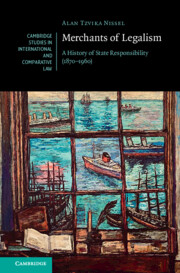Book contents
- Merchants of Legalism
- Cambridge Studies in International and Comparative Law: 190
- Merchants of Legalism
- Copyright page
- Dedication
- Epigraph
- Contents
- Acknowledgments
- Prologue
- 1 The Responsibilities of States in International Law
- 2 The US Turn to the Technique of International Arbitration
- 3 The Creation of State Responsibility in the New World
- 4 International Responsibility as German Philosophy
- 5 State Responsibility as World Order
- Epilogue
- Bibliography
- Index
- Cambridge Studies in International and Comparative Law
3 - The Creation of State Responsibility in the New World
Published online by Cambridge University Press: 19 December 2024
- Merchants of Legalism
- Cambridge Studies in International and Comparative Law: 190
- Merchants of Legalism
- Copyright page
- Dedication
- Epigraph
- Contents
- Acknowledgments
- Prologue
- 1 The Responsibilities of States in International Law
- 2 The US Turn to the Technique of International Arbitration
- 3 The Creation of State Responsibility in the New World
- 4 International Responsibility as German Philosophy
- 5 State Responsibility as World Order
- Epilogue
- Bibliography
- Index
- Cambridge Studies in International and Comparative Law
Summary
Through diplomatic protection, aliens could invest abroad with the expectation that if they were injured in an unstable country, international law would provide an additional framework of protection. The US practice ensured that the content and scope of international obligations would extend beyond ad hoc diplomacy to international arbitration, where professional lawyers began to articulate general principles of state responsibility. The most important of these principles was the minimum standard of care owed to aliens. If a state failed to meet international standards, its legal responsibility was engaged. Latin American lawyers, however, were unhappy with state responsibility being applied in this way. In response to what they viewed as legal imperialism, Latin Americans expanded the doctrine to apply to the US and Latin Americans alike and to the violation of any international obligation and not just alien protection. In this way, what began as a narrow practice in Latin America, grew into a general framework of international law enforcement.
Keywords
- Type
- Chapter
- Information
- Merchants of LegalismA History of State Responsibility (1870–1960), pp. 119 - 184Publisher: Cambridge University PressPrint publication year: 2024

